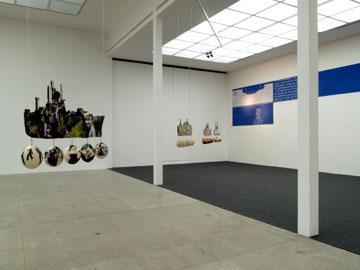The Government
dal 23/2/2005 al 24/4/2005
Segnalato da
Sonia Abian
Carlos Piegari
Ibon Aranberri
Maja Bajevic
James Coleman
Alice Creischer
Danica Dakic
Ines Doujak
Peter Friedl
Andrea Geyer
Sanja Ivekovic
Ambrogio Lorenzetti
Rainer Oldendorf
Alejandra Riera
Fulvia Carnevale
Dierk Schmidt
Allan Sekula
Andreas Siekmann
Hito Steyerl
Jurgen Stollhans
Graciela Carnevale
Francesca Woodman
Olivier Zabat
Ruth Noack
Roger M. Buergel
23/2/2005
The Government
Wiener Secession, Wien
Elysian Spheres of Action

DIE REGIERUNG (The Government)
Paradiesische Handlungsraume (Elysian Spheres of Action)
Curated by Ruth Noack and Roger M. Buergel
Sonia Abian / Carlos Piegari, Ibon Aranberri, Maja Bajevic, James Coleman,
Alice Creischer, Danica Dakic, Ines Doujak, Peter Friedl, Andrea Geyer,
Sanja Ivekovic, Ambrogio Lorenzetti, Rainer Oldendorf, Alejandra Riera /
Fulvia Carnevale, Dierk Schmidt, Allan Sekula, Andreas Siekmann, Hito
Steyerl, Jurgen Stollhans, Archivo Tucuman Arde (Graciela Carnevale),
Francesca Woodman, Olivier Zabat et al.
Does it make sense to conceive of government not in terms of those who act
but in terms of actions? Does it make sense to dispense with the
Milosevics, Berlusconis, Putins, Bushs, Schussels and their ilk and to
indulge ourselves for a while in the beauty of political abstraction? For
a while that lasts about as long as a visit to an exhibition?
The theme of this exhibition is not very original. As early as in the
fourteenth century, art was portraying the effects of government - on
people, animals, landscapes and economies (Ambrogio Lorenzetti, Allegory
of Good and Bad Government, Siena Town Hall). In a similar vein, but a few
centuries later, the French philosopher Michel Foucault proposed an
interpretation of government as an action that acts upon other actions
(the actions of others).
Such a focus on the spheres of action has advantages, especially if it
helps to avoid the tired oppositions of individual and state power, of
local and global conditions and thus allows new and different perspectives
on power relations. (Certain things, however, such as torture or
deportation, must remain to be named again and again for what they are).
"Actions that act upon other actions (the actions of others)" - how does
this relate to art? - In a mediated way: Since it is the medium of
exhibition, that allows art to become visible, the actual space of the
exhibition can itself be seen as a sphere of action, regulated by
interventions. In the series of shows to date (Luneburg, Barcelona,
Miami), Die Regierung (The Government) has covered various interventions
ranging from the dissipation of Europe's education system to the
anhiliation of collective memory. At Secession, we focus on an aspect that
is intrinsic to art: artworks themselves are condensed actions.
To conceive of art as an action does not necessarily imply that art must
somehow or other be seen as an intervention in reality. Instead, art's
capacity to act is realized only in the process of aesthetic experience.
Thus, action can also be seen perceived in the interaction between
artworks and their audience, which in turn is conceived only in the act of
reception itself.
Paradiesische Handlungsraume, then, is an attempt to take up the condensed
actions of specific artworks in the form of the exhibition itself, even to
fuse them in what might be seen as a three-dimensional film. And it seeks
to involve the viewers in its compositional endeavor: every Tuesday, the
"film" changes its mise-en-scene, with the individual "takes" commenting
on, revising and overlapping each other, contextualizing works
differently, or setting them free of all relations. Thus, we hope to
achieve a dynamic picture of our world, a picture in which, moreover, we
ourselves play a part.
The claim that an audience itself is the product of a process of reception
is meant quite seriously. How then does the exhibition's experimental
sphere of action effect those who visit the show? In order to play back
these effects into the experience of the exhibition itself, we are working
with high school students, who will be responsible for a part of the
Secession's educational program during the show: Twice weekly, a group of
students will act as guides through the exhibition, initiating anyone who
wishes to be enlightened.
Image: James Coleman, Duck – Rabbit, 1973, slide projection / 81 black-and-white slides continously projectedl / dimensions variable
TALK, March 10, 2005, 6.30 p.m.
The curators Ruth Noack and Roger M. Buergel with Alice Creischer and Andreas Siekmann, artists of the exhibition.
Organised by Friends of the Secession.
Secession
Friedrichstrasse 12 A- 1010 Vienna
Hours:
Tuesday to Sunday 10 a.m. – 6 p.m. / Thursday 10.am. – 8 p.m.



